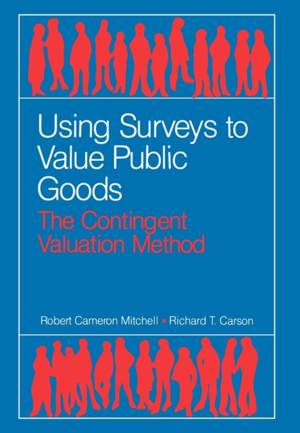
- Retrait gratuit dans votre magasin Club
- 7.000.000 titres dans notre catalogue
- Payer en toute sécurité
- Toujours un magasin près de chez vous
- Retrait gratuit dans votre magasin Club
- 7.000.0000 titres dans notre catalogue
- Payer en toute sécurité
- Toujours un magasin près de chez vous
Using Surveys to Value Public Goods
The Contingent Valuation Method
Robert Cameron Mitchell, Richard T CarsonDescription
Economists and others have long believed that by balancing the costs of such public goods as air quality and wilderness areas against their benefits, informed policy choices can be made. But the problem of putting a dollar value on cleaner air or water and other goods not sold in the marketplace has been a major stumbling block. Mitchell and Carson, for reasons presented in this book, argue that at this time the contingent valuation (CV) method offers the most promising approach for determining public willingness to pay for many public goods---an approach likely to succeed, if used carefully, where other methods may fail. The result of ten years of research by the authors aimed at assessing how surveys might best be used to value public goods validly and reliably, this book makes a major contribution to what constitutes best practice in CV surveys.
Mitchell and Carson begin by introducing the contingent valuation method, describing how it works and the nature of the benefits it can be used to measure, comparing it to other methods for measuring benefits, and examining the data-gathering technique on which it is based---survey research. Placing contingent valuation in the larger context of welfare theory, the authors examine how the CV method impels a deeper understanding of willingness-to-pay versus willingness-to-accept compensation measures, the possibility of existence values for public goods, the role of uncertainty in benefit valuation, and the question of whether a consumer goods market or a political goods market (referenda) should be emulated. In developing a CV methodology, the authors deal with issues of broader significance to survey research. Their model of respondent error is relevant to current efforts to frame a theory of response behavior and bias typology will interest those considering the cognitive aspects of answering survey questions.
Mitchell and Carson conclude that the contingent valuation method can obtain valid valuation information on public goods, but only if the method is applied in a way that addresses the potential sources of error and bias. They end their book by providing guidelines for CV practitioners, a list of questions that should be asked by any decision maker who wishes to use the findings of a CV study, and suggestions for new applications of contingent valuation. Additional features include a comprehensive bibliography of the CV literature and an appendix summarizing more than 100 CV studies.
Spécifications
Parties prenantes
- Auteur(s) :
- Editeur:
Contenu
- Nombre de pages :
- 482
- Langue:
- Anglais
- Collection :
Caractéristiques
- EAN:
- 9780915707324
- Date de parution :
- 01-03-89
- Format:
- Livre relié
- Format numérique:
- Genaaid
- Dimensions :
- 163 mm x 242 mm
- Poids :
- 830 g

Les avis
Nous publions uniquement les avis qui respectent les conditions requises. Consultez nos conditions pour les avis.






